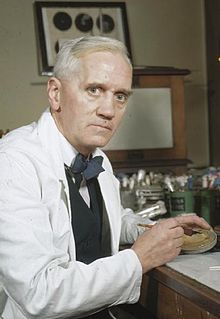People all over the world began calling it a wonder drug. Penicillin. The discovery of penicillin became a gateway for more transformative discoveries. But shockingly, to our surprise, the discovery of such a crucial drug came about from an accident in an experiment in the laboratory of Dr. Alexander Flemming in 1928.
So who was Dr. Alexander Flemming before he became famous for discovering our “wonder drug” penicillin? He was third of the four children descended from lowland farmers in Scotland. Born in 1881, Alexander’s father died when he was at the vulnerable age of seven. He began his educational enlightenment at a moorland school in a small town called Darvel in Scotland, UK.1 Here, twelve students of all ages were taught in a single classroom. Following this, he attended Darvel School, which was a four mile walk for Alexander every school day. After witnessing his potential, he was awarded a two-year scholarship to attend Kilmarnock Academy in Scotland. After those two years, Alexander moved to London where he lived with his older brother Tom. Many of his brothers similarly fled the life of farming to live with Tom. Hugh, the oldest brother, was the only one left to attend the farm.
At the age of twenty, Alexander worked in a shipping office for four years, before he inherited some money from his uncle John Flemming. It was his older brother Tom who encouraged him to follow the same career as him, a physician, and so he did. Excelling academically, it was no surprise he was awarded a scholarship to St. Mary’’s Hospital Medical School in London. Coming from little money, Fleming sought after a brighter future than the one that was waiting for him at the family farm. His decision illustrates the endless possibilities that can come from what a person chooses to make of their situation.
Alexander Flemming was a scientist beginning another one of his multiple research experiments. He was a professor at St. Mary’s hospital, and oversaw a clinic that focused on patients who suffered from boils. Because of all this, he was asked to write on staphylococci, which is a type of bacteria that causes staph infections such as skin infection and blood poisoning. It was 1928, and he began examining the various properties of staphylococcus. Towards the end of July of that year, Flemming was packed up and eager to return home on vacation. He stacked his plates on the lab bench sitting along with many other plates from previous experiments.2 There were plates that were in desperate need to be washed and cleaned up. But Flemming was known for keeping his plates an extended period of time after incubation.
When he returned from his vacation, on Monday, September 3rd, he examined the staphylococci culture plates. Keep in mind that it was unusual to leave culture plates at room temperature. As Fleming was resuming his usual course of action to be taken for such a typical day, he had remarked to Merlin Pryce, his research assistant, that there was a lot of work to be done. He began by taking the top of the culture plate from a stack of several grimy plates; they had some form of biological research left over from earlier experiments. During this time, he came across an unusual plate. Fleming’s response was, “that’s funny,” while Pryce simply brushed it off as one of the plates that helped Fleming discover lyzosome, which was a previous experiment of Fleming’s. To his surprise, the growth of staphylococcus had been diminished, and instead, the mold had grown towards one end of the plate. That is, the bacteria surrounding the mold was being destroyed. The mold had grown on one side of the plate. The shock wasn’t from the presence of mold, which would probable happen in any biological experiment. Rather, it was the complete disappearance of the cultures of staphylococcus. This told him that there was antibacterial substance in the mold that caused the disappearance of staphylococcus. So he decided to make another culture of the mold in a tube of nutrient broth. After a week of being left in the tube, the culture that was diluted about 500 to 800 times had actually inhibited the growth of staphylococci again. After much research, Fleming discovered that this mold belong to the family of penicilliium and was eventually named Penecillium Notatum.3 This was Alexander Fleming’s aha moment, the discovery of penicillin.
Just imagine conducting an experiment for your organic chemistry or biology lab; resuming your usual routine, you’ve come across a potential discovery. Fleming had no intention of achieving such a discovery. In his research he had described it as a “white fluffy mass which rapidly increases in size…cultures darken to almost black.”4 But we have Fleming and his curiosity to thank in this very moment. Just as Pryce had done in that moment, so could Fleming have chosen to ignore the plate and simply wash away the bacteria from the plate. But Fleming instead decided to explore what he saw as curious. It was this very moment that penicillin was discovered. Alexander Fleming was a very disorganized scientist. He was known for leaving his plates all over the bench and his experimental items left in the same place for days before cleaning up. Had he been a more organized scientist in his laboratory, penicillin might never have been discovered. One might say it is because of his untidiness that penicillin had been brought to discovery.5

Thus, the accidental discovery of such a drug sparked positive outcomes for the world in multiple ways. It immediately began saving the lives of hundreds of thousands of people who, prior to 1929, could not be saved with such assurance and ease from their sicknesses. Alexander Fleming was a bright scientist, but that is not to say that his discovery of penicillin was intentional. His messiness and curiosity is what allowed him to come across such a life-changing drug. On another note, discovery of penicillin was just a taste of what the medical science community has been capable of, and it sheds light on how much more there is still to be discovered. Penicillin was not the first and definitely would not be the last accomplishment for American medicine and for the world population.
- Complete Dictionary of Scientific Biography, June 2008, s.v. “Alexander Flemming,” by Charles Gillispie. ↵
- Daniel Schwarz, “The Mold that Fights for the Life of Man,” New York Times, January 2, 1944. ↵
- Daniel Schwarz, “The Mold that Fights for the Life of Man,” New York Times, January 2, 1944. ↵
- F.W.E. Diggins, “The true history of the Discovery of Penicillin, with refutation of the Misinformation in the literature,” British Journal of Biomedical Science 56, no.1 (January 1999): 85. ↵
- F.W.E Diggins, “The true history of the Discovery of Penicillin, with refutation of the Misinformation in the literature,” British Journal of Biomedical Science 56, no.1 (January 1999): 85. ↵



63 comments
Michael Thomas
I found this article interesting because of how it details Alexander Fleming’s discovery of penicillin. If Fleming cleaned the culture plates, we would not have some of the antibiotics and other cures we have today. Fleming’s “accidental” discovery revolutionized the field of science because of his curiosity to examine the culture plate covered in bacteria. Overall, this article was good.
Auroara-Juhl Nikkels
The only thing I knew about penicillin is that I was allergic to it. Your article is very informative and interesting to read. It give plenty if information in a precise and comprehensive way. I think it’s funny that it was created by accident. I mean, if Flemming had just decided to ignore what he saw, I wonder how long it would have taken for scientist to discover penicillin.
Cristina Cabello
This reveals how everything really does happen for a reason. So many tests and experiments are made to find revolutionary results. In this case Alexander Fleming was known for his messy experiments. Or he would take too long to clean up his mess. Which ended up being a good thing. If Fleming was quick to clean up, then he would not have made his revolutionary discovery.
Destiny Flores
This historical moment of serendipity is no stranger to anyone, especially those in the biological and medical fields. This accident changed the world of medicine forever and is still continuing to do so. I thought it was so cool he attended a hospital that so happens to have the same name as our institution! I’ve learned about Flemming many times in my education and never once heard that part of the story. Great insight!
Hector Garcia
It’s incredible what Dr. Alexander Flemming did to revolution the field of medicine. The world might have not been the same if Dr. Flemming would not have discovered penicillin. It is interesting to read about the origins of Dr. Flemming and the story of how penicillin is unique. I would have never thought that penicillin would have been discovered thanks to Flemming’s messiness and curiosity.
Angelica Padilla
Never did I know this was something from an accident. I think many things become to be by accidents, or are done on accident. But it is impressive that Flemming noticed and took a closer look rather than ignore his discovery. It’s crazy knowing that Flemming was an unorganized scientists, and just left his plates around anywhere. I am curious to know though, if his assistant got any credit for this discovery as well? Because he kind of just brushed off the remark Flemming had made.
Julio Morales
I always assumed that penicillin was discovered through research and hard work but for it to happen by accident is just mind blowing. It just goes to show that maybe doing things a different way is not always a bad idea. Some could argue that he didn’t do anything and that he shouldn’t get much praise since it was an accident, but his attention to detail about noticing that the staphylococcus had been destroyed was vital to the discovery of penicillin. He could’ve returned from vacation and noticed that he left his experiments for a long time in room temperature and simply discarded them.
Tyler Thompson
It’s interesting to know that one of the most common drugs used today was discovered by accident. Most people spend their whole life in research to discover the next ground breaking discovery. Thousands of people have been saved from the drug, and due to unexpected events, his name and reputation has been given a good name. Who knows what accident may be next.
Johnanthony Hernandez
I’ve always found it interesting to think that something that something that I myself and many others have used countless times was discovered by accident. As well as that the individual that discovered it was, like many others, raised in a humble environment and wanted to better himself at an early age. But to think that he was surprised that mold is what was killing the staphylococcus bacteria and that if he had cleaned the testing plates we wouldn’t have Penicillin.
Lauren Castillo
As someone who is allergic to both mold and penicillin it was fascinating to learn about something I never thought of or considered an option. You would think medicines were developed after years of experiments and multiple tests. It’s funny to find that a very popular and effective antibiotic was created by accident. Just think we might not have penicillin if Alexander Flemming bothered to wash his plates.